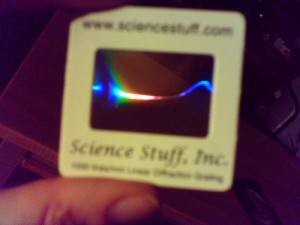 We just had a practical lab with Jim Verley dealing with spectrometry. It was fairly low tech, mostly to give us an understanding of how this stuff works. He started off by talking about how other sciences, like biology or chemistry, you get an item and take it back to the lab and do experiments on it.
We just had a practical lab with Jim Verley dealing with spectrometry. It was fairly low tech, mostly to give us an understanding of how this stuff works. He started off by talking about how other sciences, like biology or chemistry, you get an item and take it back to the lab and do experiments on it.
But you can’t do that with astronomy. There are few items from space on Earth with which to do experiments. They are here, but most of what astronomers work with is light.
He talked about Kirchoff’s three laws of spectroscopy.
And then we did some very simple spectrometry lab work, just to get an idea of what the tools were. Jim gave us each th is slide which had a diffraction grating film in it. When you looked through the grating at a light source, by noticing which spectral lines were present. You can see a little bit of the prisming of the light in the slide.
is slide which had a diffraction grating film in it. When you looked through the grating at a light source, by noticing which spectral lines were present. You can see a little bit of the prisming of the light in the slide.
He had different tubes of gas which he excited with voltage to make them glow. When you looked through the grating, the lines were very clear. Most of the time.
After we looked through the grating, we compared the lines that we saw with a chart of various gases. It was a lot of fun and a welcome break from the lectures.
Don’t get me wrong, I’m enjoying the lectures, but getting up and doing something made a good break in the style of learning we were doing by going from auditory/visual to visual/kinetic. My brain is very full.
BUT I’ve already gotten one idea out of yesterday’s lectures that I’m folding into the SF story I’m working on now. Speaking of… I should take advantage of the break and get back to it.


I’m finding these posts very entertaining. Thanks for putting them up!
My pleasure. I feel like I’m hitting people with a deluge of posts, so I’m glad to hear that you’re enjoying it.
sniff. I miss Launchpad. Say hi from me!
I will. I see why you were so excited that I was going. It is fantastic.
I’ve been enjoying these, too. I’d never heard of this before, and have saved a few handy links. Fabulous stuff!
I knew about it because Rob talks about spectrometry as a way of analyzing wine.